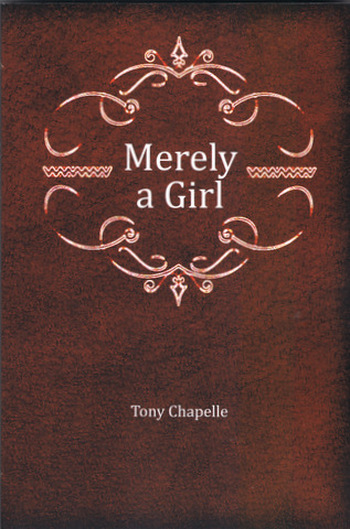
Merely a Girl
By Tony Chapelle
Merely a Girl is the story of Addie – Adelaide Augusta Gilbard – and how she comes to settle in New Zealand in 1860. The book opens in 1863 with the first entry from a diary that Addie has decided to keep. In it, she reflects on the people she had known she would miss when she and her new husband left England, and other things that, to her surprise, she has come to miss as well. The physical – geographical – differences between early New Zealand and the rural England that she has left behind are highlighted too in a way that draws a sharp contrast between the old world and the new.
From this opening chapter Chapelle takes us back to 1858 and introduces us to the family members, friends and acquaintances, and at least one villain, who people Addie’s world as she finishes school and reaches her eighteenth birthday.
Like an artist, Chapelle paints a subtle portrait of genteel rural society in the mid-1800s. Addie is the central figure in this circle of characters – not only because she is the girl in the book’s title, but also because her late and doting father told her so. He inspired her to believe in herself and to know that she was special, and could achieve anything, and she is surrounded by admiration and affection. However, her father omitted to warn her that all is not always as it seems, including the fact that having mixed race ancestry – being not entirely English – is still very much frowned on.
As Addie’s story unfolds from 1858 until her marriage two years later, Chapelle gives his readers many opportunities to reflect on the lot of women at that time and on how our approach to various social issues has evolved in the intervening years.
By the time Addie meets her husband-to-be, gets engaged and married, in the final quarter of the book, Chapelle has covered such points as racism, anorexia, unrequited love, schoolgirl crushes at boarding school, the role of the clergy, gambling, abuse of the disabled and illegitimacy.
Merely a Girl ends with another excerpt from Addie’s diary, dated July 1863, describing her earliest experiences of life in the colonies, and expressing her wish for future readers to have a true picture of who she, Adelaide Augusta Gilbard, was. In leading up to these closing pages, Chapelle has certainly fulfilled Addie’s wish. In doing so, he has presented his readers with a vivid overview of what those ancestors of ours who came to New Zealand 150-odd years ago had left behind, and what personal baggage they brought with them.
Review by Carolyn McKenzie
Title: Merely a Girl
Author: Tony Chapelle
Publisher: Rangitawa Publishing
ISBN: 978-0-9941268-0-1 Format: paper RRP $35.00
Availability: Amazon, the Publisher, Bruce McKenzie Booksellers
Author: Tony Chapelle
Publisher: Rangitawa Publishing
ISBN: 978-0-9941268-0-1 Format: paper RRP $35.00
Availability: Amazon, the Publisher, Bruce McKenzie Booksellers
No comments:
Post a Comment